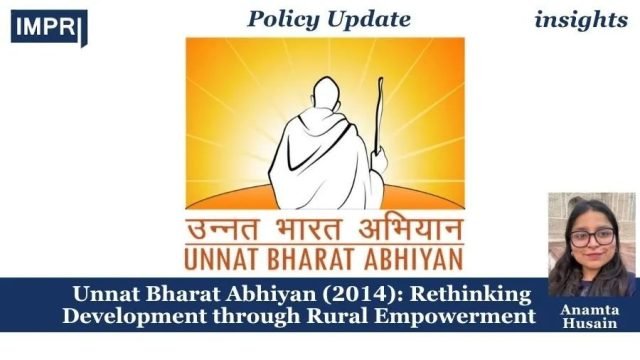Policy Update
Anamta Husain
Introduction
Unnat Bharat Abhiyan (UBA), a flagship program of the Ministry of Education, Government of India, seeks to promote inclusive growth by aiming for transformative change in rural areas through collaboration with educational institutions. The program aims to harness the expertise of the country’s higher educational institutions in building eco-friendly and sustainable methods for rural development. The main themes covered under UBA are: Organic Farming, Water Resource Management, Renewable Energy, Artisans Industries & Livelihood, and Basic Amenities.
A committed team of faculty members from the Indian Institute of Technology (IIT), Delhi, were behind the conceptualisation of Unnat Bharat Abhiyan (UBA). These members had specialisation in rural development and appropriate technology. The concept was developed further through wide-ranging consultations with diverse representatives in technical institutions, Rural Technology Action Group (RuTAG) coordinators, voluntary organisations, and government agencies, who were already active in this area. Unnat Bharat Abhiyan was officially launched by the Ministry of Education (MoE), Government of India, on November 11, 2014, in a ceremony presided over by the President of India.
Mission
In India, educational institutions were primarily involved with the industrial sector, offering minimal impact on rural progress due to limited engagement with agriculture and related sectors. Unnat Bharat Abhiyan plays a prominent role in keeping rural development at the forefront and encouraging educational institutions to contribute to inclusive and sustainable progress.
The program’s rationale is based on Mahatma Gandhi’s critique of the Western model of development in his book Hind Swaraj. He argues that the Western model’s reliance on urbanisation and centralised technology has led to rising inequality, environmental degradation, and climate change. Rather than urbanising rural areas, Gandhi envisioned self-reliant “village republics,” where development would come about through local resources and eco-friendly technologies. Through this vision, essential needs such as food, healthcare, education, shelter, energy, transportation, sanitation, etc, would be solved through a localised approach rather than going on the path of urbanisation.
Currently, approximately 70% of the country’s population resides in rural areas and mostly depends on the agrarian economy. Around 51% of the total workforce of India is employed in agriculture and its allied sectors. However, even after employing almost half of the workforce, the total contribution of this sector is only 17% of the country’s total GDP. The emerging urban-rural disparity creates a gap in healthcare, education, infrastructure, and employment. However, the solution to this stark disparity does not lie in further urbanisation. It lies in the fact that sustainable development requires a shift towards localised solutions, where eco-friendly development is prioritised for the creation of local livelihoods.
Features
- To establish effective mechanisms and proper coordination between various stakeholders, like the educational institutions, implementation bodies, including Panchayati Raj Institutions/District Administration and various grassroots-level organisations, to ensure impactful field intervention.
- To shift the curriculum design and research in higher educational institutions to make them more responsive to prevailing challenges.
- To enrich students’ knowledge of present-day rural and societal issues so that they can foster an understanding of holistic development.
- To identify suitable rural clusters to contribute effectively to their comprehensive development by utilising sustainable and eco-friendly technologies and local resources, thereby also generating employment opportunities.
Organizational Structure
Unnat Bharat Abhiyan has a comprehensive organisational structure that ensures the proper guidance, planning, implementation, and monitoring of the program at the national level.
- Sponsoring Ministry: Unnat Bharat Abhiyan (UBA) is a national initiative launched by the Ministry of Education (MoE), Government of India, earlier known as the Ministry of Human Resource Development.
- National Steering Committee (NSC): The committee is constituted by the MoE and provides guidance, direction, planning, and required thrust to the programme at the national level.
- National Executive Committee (NEC): This committee is involved in taking key policy-related decisions under Unnat Bharat Abhiyan.
- National Coordinating Institute (NCI): IIT Delhi serves as the NCI, overseeing the implementation and monitoring of the program nationwide.
- National Subject Expert Advisory Committee (NSEAC): NSEAC ensures the effective implementation and outcomes of technological interventions in the villages. They aim to enhance the technical and social impact of the program at the ground level.
- Regional Coordinating Institutions (RCI): 50 institutions have been designated as RCI based on their infrastructural competence and expertise. They have the following roles:
- To act as nodal centres to promote UBA in their regions.
- To support Participating Institutions in creating innovative solutions for prevailing issues in the rural areas.
- To guide, facilitate, and monitor PI initiatives in their regions.
- Participating Institutions (PIs): Higher education institutions can join UBA by becoming Participating Institutions through online registration. Some of their responsibilities include:
- To identify 5 villages in consultation with the district authorities, which will undertake activities under UBA.
- To undertake field studies, monitor implemented government schemes, and effectively work towards their better implementation.
- To work with the state government, PRIs, district authorities, and non-governmental bodies to develop solutions for increasing social and economic well-being in rural regions.
- Subject Expert Groups (SEGs): These groups provide strategic and operational expertise to institutions involved in rural work under UBA.
Key Merits
- Participatory Development Approach: UBA adopts a participatory development approach across all three stages: planning, implementation, and monitoring. This model ensures that the activities reflect the aspirations of the people while remaining adaptable to the changing needs of rural communities.
- Increased Engagement of Rural Communities: By giving local communities an active role in the decision-making process, UBA fosters a sense of participation and ownership in local communities. This strengthens efforts towards rural development by increasing local engagement in the initiatives.
- Collaboration of Resources and Expertise: UBA brings together knowledge systems of academic institutions with governmental and non-governmental bodies, and local communities to work in a collaborative framework towards innovative and sustainable solutions.
- Scientific & Technological Intervention: UBA promotes cutting-edge scientific and technological solutions to address challenges in rural communities. It aims to incorporate innovative and context-relevant solutions into rural development efforts to ensure sustainable and meaningful progress.
- Reorienting Research and Development (R&D): UBA emphasises a paradigm shift in research and development design. It encourages methodologies that work towards not just scientifically robust but also contextually relevant solutions that consider the specific needs of local communities.
Way Forward
Unnat Bharat Abhiyan offers an innovative approach to prevailing issues in rural regions by leveraging academic resources. For the program to work, effective coordination between faculty, students, the local community, and other stakeholders is very important. Under UBA, faculty might also have to invest time beyond their teaching duties. There can be more work toward creating a model for the institutions to integrate UBA into their academic planning, ensuring an active involvement of both students and faculty in applying technical and scholarly skills.
Conclusion
Unnat Bharat Abhiyan offers a transformative framework for rural development grounded in a deep commitment to knowledge sharing, participatory approaches, and convergence of academic, governmental, and community resources. It encourages scientific and technological interventions while also emphasising R&D reorientation towards locally grounded approaches that actively involve rural communities in shaping solutions to prevailing challenges. The program reflects a holistic approach to the sustainable and inclusive development of rural India.
References
- Government of India. (n.d.). Unnat Bharat Abhiyan | inspired by the vision of transformational change in rural development processes by leveraging knowledge institutions. Unnatbharatabhiyan.gov.in. https://unnatbharatabhiyan.gov.in/introduction
- Prabakaran, V., & Muthukumaran, C. (2019). INTERNATIONAL JOURNAL OF RESEARCH CULTURE SOCIETY IMPACT ON UNNAT BHARATH ABHIYAN SCHEME ON RURAL DEVELOPMENT OF INDIA. https://ijrcs.org/wp-content/uploads/IJRCS201905013.pdf
- Penta, S., Kandakatla, R., Depally, S., Lingam, B., Sandhya, T., Seshappa, A., & Chandana, C. (2025). Increasing regional and local relevance of engineering institutions through service learning: A case study of the Unnat Bharat Abhiyan program. Journal of Engineering Education Transformations, 38, 196–203. https://journaleet.in/index.php/jeet/article/view/2276
- Unnat Bharat Abhiyan. (2023). Unnat Bharat Abhiyan | inspired by the vision of transformational change in rural development processes by leveraging knowledge institutions. Unnatbharatabhiyan.gov.in. https://unnatbharatabhiyan.gov.in/view-themes
About the Contributor: Anamta Husain is a Research Intern at IMPRI, New Delhi. She is currently pursuing her Bachelor’s in Political Science from Ashoka University, Sonipat.
Acknowledgement: The author extends her sincere gratitude to the IMPRI team and Ms. Aasthaba Jadeja for her invaluable guidance throughout the process.
Disclaimer: All views expressed in the article belong solely to the author and not necessarily to the organisation.
Read more at IMPRI:
PM-SPECIAL: Empowering Geriatric Caregivers Through Training, 2024
Financial Assistance Schemes for Higher Education: Empowering India’s Future



















